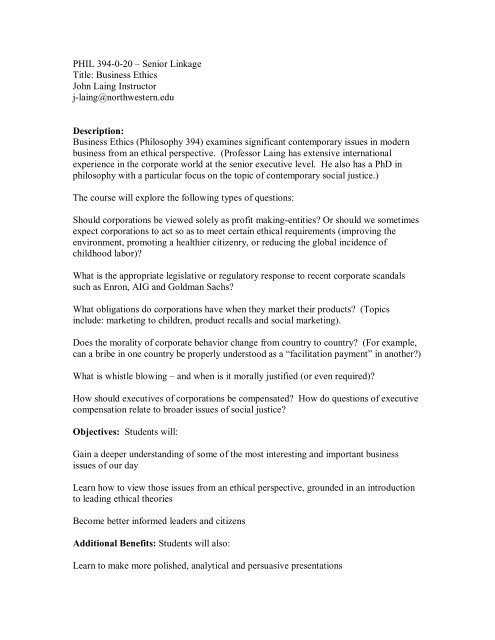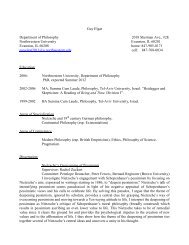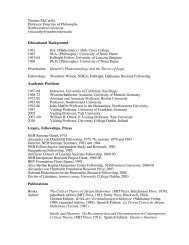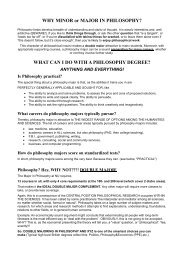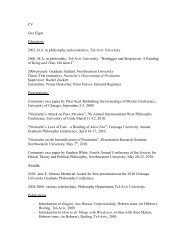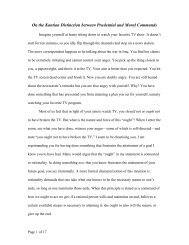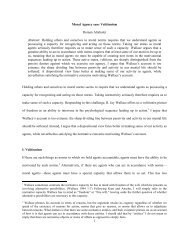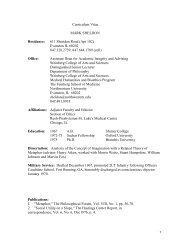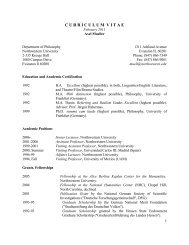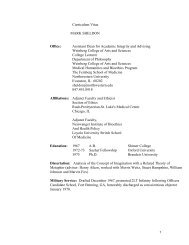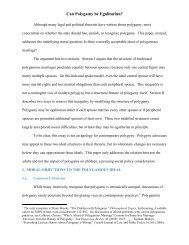Business Ethics John Laing Instructor j-laing@northwestern.edu ...
Business Ethics John Laing Instructor j-laing@northwestern.edu ...
Business Ethics John Laing Instructor j-laing@northwestern.edu ...
You also want an ePaper? Increase the reach of your titles
YUMPU automatically turns print PDFs into web optimized ePapers that Google loves.
PHIL 394-0-20 – Senior Linkage<br />
Title: <strong>Business</strong> <strong>Ethics</strong><br />
<strong>John</strong> <strong>Laing</strong> <strong>Instructor</strong><br />
j-<strong>laing@northwestern</strong>.<strong>edu</strong><br />
Description:<br />
<strong>Business</strong> <strong>Ethics</strong> (Philosophy 394) examines significant contemporary issues in modern<br />
business from an ethical perspective. (Professor <strong>Laing</strong> has extensive international<br />
experience in the corporate world at the senior executive level. He also has a PhD in<br />
philosophy with a particular focus on the topic of contemporary social justice.)<br />
The course will explore the following types of questions:<br />
Should corporations be viewed solely as profit making-entities? Or should we sometimes<br />
expect corporations to act so as to meet certain ethical requirements (improving the<br />
environment, promoting a healthier citizenry, or r<strong>edu</strong>cing the global incidence of<br />
childhood labor)?<br />
What is the appropriate legislative or regulatory response to recent corporate scandals<br />
such as Enron, AIG and Goldman Sachs?<br />
What obligations do corporations have when they market their products? (Topics<br />
include: marketing to children, product recalls and social marketing).<br />
Does the morality of corporate behavior change from country to country? (For example,<br />
can a bribe in one country be properly understood as a “facilitation payment” in another?)<br />
What is whistle blowing – and when is it morally justified (or even required)?<br />
How should executives of corporations be compensated? How do questions of executive<br />
compensation relate to broader issues of social justice?<br />
Objectives: Students will:<br />
Gain a deeper understanding of some of the most interesting and important business<br />
issues of our day<br />
Learn how to view those issues from an ethical perspective, grounded in an introduction<br />
to leading ethical theories<br />
Become better informed leaders and citizens<br />
Additional Benefits: Students will also:<br />
Learn to make more polished, analytical and persuasive presentations
Deepen their ability to listen respectfully, rationally, and critically to the (sometimes<br />
opposing) points of view of others<br />
Develop the capacity to assess public policy debates in a more informed and reasoned<br />
fashion<br />
Teaching method: Lecture and discussion<br />
Evaluation method: Oral presentation on a topic of the student’s choosing (35%), final<br />
essay exam (35%), and contribution to discussion (30%).<br />
Grading: On the first day of class, I will explain in detail my approach to grading the<br />
different elements of this course. I will distribute rubrics summarizing my approach as<br />
well. Those rubrics will be posted on Blackboard.<br />
Readings and Assignments: Selections from Ethical Issues in <strong>Business</strong>: A<br />
Philosophical Approach, ed. Thomas Donaldson and Patricia H. Warhane (8 th Edition)<br />
will provide a primary basis of reading assignments for the course (ISBN-10: 0-13-<br />
184619-1 and ISBN-13: 978-0-13-184619-7) Additional reading assignments will be<br />
posted on Blackboard. Students also will be expected to watch two movies: “The<br />
Smartest Guys in the Room” and “The Insider.” Links to both movies will be provided<br />
on Blackboard.<br />
Student Presentations:<br />
On the first day of class, we will develop together a sch<strong>edu</strong>le for student presentations<br />
during the remainder of the term. I will explain what I expect regarding presentations on<br />
the topics listed below. Students will indicate whether they have a preference as to a<br />
topic on which to present. I will try to assign presentations in a way that respects those<br />
preferences to the extent possible.<br />
The purpose, role and responsibilities of the corporation<br />
The libertarian view<br />
The stake holder theory<br />
When corporations do right (one presentation)<br />
Example: <strong>John</strong>son & <strong>John</strong>son and Tylenol<br />
Example: S.C. <strong>John</strong>son and CFCs<br />
When corporations do wrong<br />
Example: Enron<br />
Example: Goldman Sachs<br />
The problem of externalities
The “tragedy of the commons”<br />
Pollution as a global problem<br />
Legislating corporate behavior<br />
Dodd-Frank legislation<br />
Consumer Financial Protection Bureau<br />
` Ethical issues in marketing<br />
Marketing to children<br />
Product recalls and cancellations (examples include: Merck and Vioxx, Peanut<br />
Corporation of American and peanuts, Mattel and lead painted toys, Dow Corning<br />
and breast implants)<br />
Ethical corporate cultures and individual responsibility<br />
Judging the ethics of a corporation’s “culture”<br />
Whistleblowers and qui tam<br />
Ethical issues in international business (ethical and cultural relativism)<br />
Child labor laws<br />
Google in China and Microsoft in Russia<br />
CEO compensation and theories of justice --<br />
The entitlement theory (libertarianism revisited)<br />
Distributive justice<br />
Attendance and Late Assignments<br />
There will be no unexcused absences from this class. (This means there are no absences<br />
from this class not submitted to me and approved in advance.) Any more than one<br />
absence for any reason will lower your final evaluation one full letter grade. Missing<br />
assignments cannot be made up.<br />
Students with Disabilities<br />
In compliance with Northwestern University policy and equal access laws, I am available<br />
to discuss appropriate academic accommodations that you may require as a student with a<br />
disability. Request for academic accommodations need to be made during the first week<br />
of the quarter (except for unusual circumstances.) Students are encouraged to register<br />
with Services for Students with Disabilities (SSD) for disability verification and for<br />
determination of reasonable academic accommodations. For more information, visit:<br />
http://www.northwestern.<strong>edu</strong>/disability/<br />
The text for the course is Ethical Issues in <strong>Business</strong>: A Philosophical Approach, edited by Thomas<br />
Donaldson and Patricia Werhane ( ISBN-10: 0-13-184619-1 and ISBN-13: 978-0-13-<br />
184619-7). Additional materials in including links to required movies will be posted on<br />
Blackboard.


